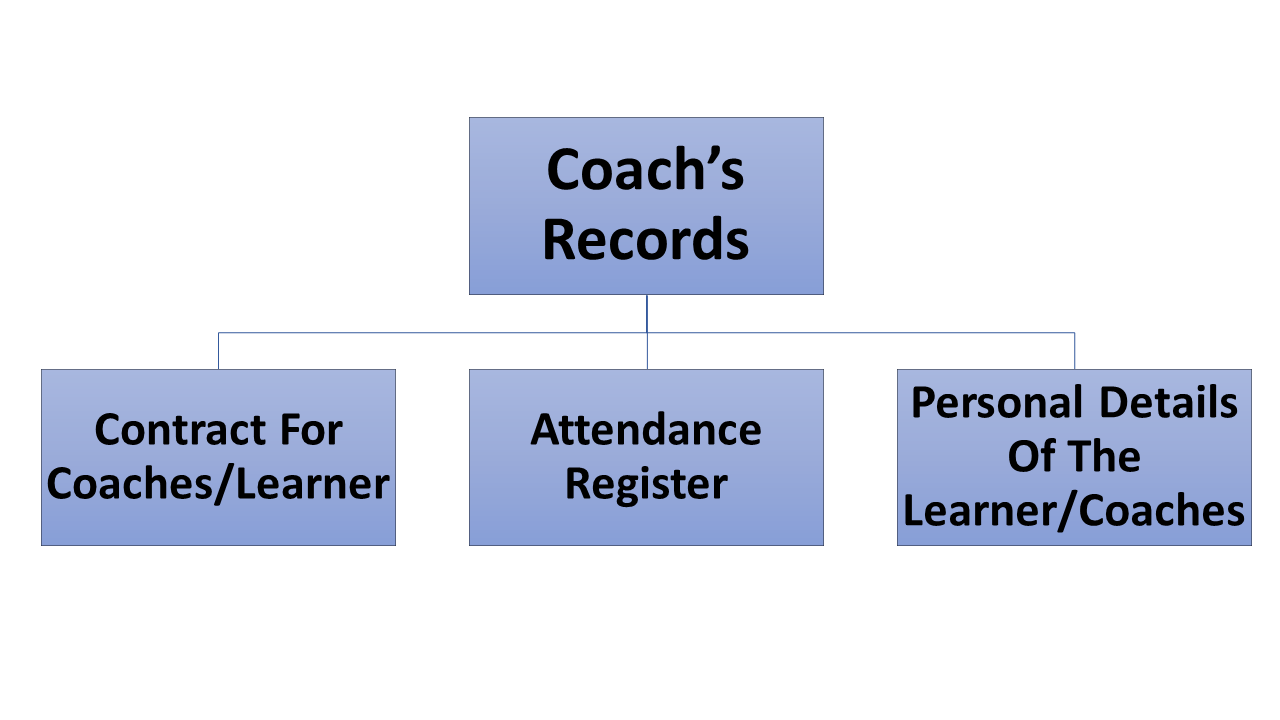The creation and maintenance of records relating to the coaches of an institution are essential to:
- Managing the relationship between the organisation and the coaches.
- Providing support and other services and facilities to the coaches.
- Controlling the coaches academic progress and measuring their achievement at the organisation.
The Purpose of Reports
Coaches need to obtain record and organise administrative information and fulfil the administrative requirements needed to manage on the job training of the coaches in their organisation.
Administrative work is concerned with organisational maintenance. It is the routine paperwork that keeps the system going. It is also a record of transactions and events for the organisation.

The most likely administrative tasks include the following:
- Coaches personal details sheet
- Coaches contracts
- Attendance registers
- Individual development plan
- Coaching schedule
- Job profile/performance outcomes
- Coaches feedback on coaching
- Coaches progress records
- Management reports
- Copy of ID
- Coaches assessment documents
- Copy of certificates
- Copy of resumé
These schedules and records should be kept simple and user-friendly. It is not necessary to have complicated forms. It is however, necessary to make sure that all your forms are filled in neatly and correctly and with all the relevant information. This will allow you to refer to information you might need quickly, as well as allow other people, who may need the information, to find it easily.
Do not leave paperwork piled up, it must be kept up to date and it must be accurate. Incorrect information is worse than no information.
You should have a file for each coach in your organisation.
Types of Records
Records are documents or other items which:
- Contain recorded information;
- Are produced or received in the initiation, conduct or completion of an activity; and
- Are retained as evidence of that activity, or because they have other informational value.
The recorded information may be in any form (e.g. text, image, sound) and the records may be in any medium or format.

Coach’s Records
Coach's records associated with managing the relationship between an organisation and its coachees/learners – can be organized into three broad categories, each of which may be additionally divided:
- Records documenting the contractual relationship between the coachee/learner and the organisation.
- Records documenting the coaches as a learner e.g. records documenting programmes undertaken, academic progress and performance, awards – usually stored by coach.
- Records documenting the coaches as an individual and consumer of services provided by the organisation e.g. records documenting use of accommodation services, counselling services, library and IT support service, careers and employment services – usually stored by the HR.
Contract for Coachee/Learner
It is important to make sure that the coaches – in this instance the new first line manager - understands what is expected of him/her during the course of the learning programme. The contract outlines the terms and conditions of the coaches/learner being accepted onto the programme and the obligations of the learner throughout the duration of the programme.
Click here to download an example of a contract.
Attendance Register
The coach records coachee’s names, surnames, dates of coaching and classes and attendance at each session.
The attendance register allows the coach to detect absenteeism problems, which can then be addressed. Irregular attendance is disruptive to the learning process and cannot be allowed to continue. This information is also important to management and funders.
Click here to download an example of attendance register.
Personal Details of the Learner/Coachee
There must be recording of each individual that is on a coaching process to keep track of who is on the programme and who is coaching whom in the organisation.
Click here to download an example of coachee/learner personal details.
Management Reports
The coach will normally submit a report to management on a monthly basis.
Management reports used to keep your management team informed about your activities as a coach and the activities and progress of the coaches.
Reports keep the management team up to date. They need to know:
- What you are doing,
- How you are doing, and
- What the problem areas are.
Management also need to be informed of the coach’s reaction to the process or areas that may be deemed problematic.
Most importantly, managers need to know whether or not the coaches and coachees are reaching the targets set and expectations laid down at the start.
Coachee/Learner Progress Records
The coach is responsible for keeping records of the coachee/learner progress.
Coachee/learner progress records consist of all test results and evaluations.
Coachee/learner records also provide important information to management and funders. They make the task of report writing much easier for the coach.
Without coachee/learner records there is no way of proving what the coachee/learner has achieved during the learning programme.
Example learner progress records are essential. They are a means of tracking how each coachee/learner is doing and are an effective way of identifying any problems the coachee/learner may have.
Click here to download an example of a Learner Progress Report.
Individual Development Plan
After your discussion with the coaches on his/her progress/the two of you will have to decide what actions you have to take to address any not yet competent areas.
Click here to download an example of an individual Development Plan.
Coaching Schedule
A planning schedule assists you in organising the coaching programme
A well-organised coaching programme that is structured to meet your targets and the coachee/learner needs is a vital component of any education and training experience. Without proper planning, chaos is the order of the day.
Click here to download an example of a coaching schedule.
Coaches Feedback Form
Feedback on the coaching and the learning event is sought from the coaches in the form of open-ended questions.
The actual outcomes of the event are compared to planned outcomes.
Plausible reasons are given for the relative success or failure of units. Feedback from coaches and their own reflections is formulated into resolutions and future events.
Click here to download an example feedback form.